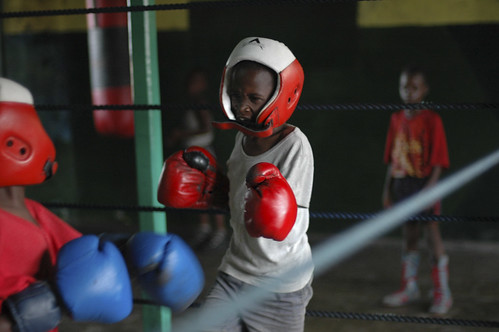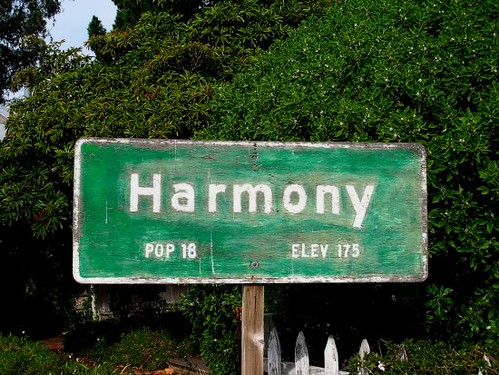One of the frameworks she's discussing is the one that I've been so interested in and have written about on this blog several times: agonism.
She describes agonism as "more conflictual than communitarian or liberal discourse but not quite the verbal free-for-all of interest-based discourse." It is a conflict, to be sure, but a conflict bound by rules of engagement, common boundaries.
One of the criticisms against the agonistic model is that it reinforces "masculinist views of language as combat and domination." In fact, feminist forms of rhetoric have often been focused on communitarian goals based on harmony.
Harmony, though, has its own set of problems. As bell hooks notes when discussing her experience with feminist groups, it is "common for dissenting voices to be silenced by the collective demand for harmony." We want so badly not to fight that we can ostracize anyone who disagrees, thus ensuring a conflict-free zone, one whose borders are maintained through unity cloaked with hegemony.
As Walter Ong notes in Fighting for Life, "[c]ontest is a part of human life everywhere that human life is found" (15).
Notice that Ong says it is a part of human life, not male life. Still, tension and conflict require an assertiveness that has been consistently conflated with masculinity.
I object.
I object to the notion that assertiveness is a "masculine" trait. Sure, it is a powerful trait, and--in a patriarchy--it has often been wielded as a weapon to maintain a masculine power hierarchy, but just because it has been held up as a weapon in the hands of patriarchy does not mean that it is in its sole possession.
In fact, I call bullshit on all of that.
When I read David Gold's Rhetoric at the Margins, I learned about Melvin B. Tolson, a progressive debate coach and English instructor at Wiley, a black Texas college. In his discussion of Tolson, Gold notes that Tolson did not shy away from teaching his students what has sometimes been labeled a "white" discourse. This was not, in Tolson's mind, an acquiescence to mainstream white supremacy; it was a reclamation of the tools of oratory as belonging as much to him and his students as they do to anyone else. Gold explains:
Here are a few examples where I see the conflation of strength and assertiveness with "masculinity" being used (often by women themselves) to keep women confined:
I wrote recently about how out of place I felt in the weight room, even though I knew that the boundaries I was setting were in my own head. In fact, the men who dominate that side of the gym have been oblivious to me at worst and welcoming at best. They weren't erecting these walls; I was.
But the notion that women shouldn't lift heavy weights, can't get "bulky," or will look "manly" if they try to assert their physical strength is a common one.
Just read how this personal trainer often hides her muscular arms under a jacket to avoid scaring female clients away. Or this recent post from fitness blogger Erika Kendall on all the women she hears from who tell her they're afraid of looking manly if they lift weights. Or how a picture of Cameron Diaz in a bikini sparked a debate over how muscular female celebrities should be.
Nevermind that weight lifting has been found to have a host of benefits that range from the vain (you look pretty) to the pragmatic (you're less likely to fall and hurt yourself). We're told over and over again that the important thing here is to look "feminine" and the feminine cannot mean "strong."
Says who? Why are we accepting that message?
British feminist Caitlin Moran made headlines recently for sparking a day of #twittersilence. This was to protest some awful misogynistic death and rape threats being made on the social media platform.
The thing is, though, silence isn't a very effective form of protest, which seems to be apparent in the aftermath. Jezebel reports that:
I believe that the creators and participants of #twittersilence were well-intentioned, but the oppressed being silent in the face of their own oppression is not new or ground-breaking. In fact, it is the status quo.
I refuse to accept that asserting my own voice is "masculine" and thus upholding a system of oppression. I refuse to accept that using my female body to demonstrate strength is not "feminine." I refuse to accept these narrow confines because they are just that: confines. They are attempts (by whom, at this point, I can't even be sure) to keep the traditionally silenced voiceless.
Strength is not gendered. Strength belongs to us all, but we will have to claim it for ourselves.
I challenge you to do the same. Raise your voices and your dumbbells. Don't fall into this trap, especially since we may very well have set it for ourselves.
When I read David Gold's Rhetoric at the Margins, I learned about Melvin B. Tolson, a progressive debate coach and English instructor at Wiley, a black Texas college. In his discussion of Tolson, Gold notes that Tolson did not shy away from teaching his students what has sometimes been labeled a "white" discourse. This was not, in Tolson's mind, an acquiescence to mainstream white supremacy; it was a reclamation of the tools of oratory as belonging as much to him and his students as they do to anyone else. Gold explains:
Tolson did not worry whether the master's tools could tear down the master's house; he did not believe the tools belonged to the master in the first place--or, for that matter, the house.Just as the gifts of oratory and literary traditions are not "white"--though they have often been co-opted and wielded to maintain white supremacy--assertiveness and strength are not "masculine" and believing that they are, believing that to step into these spheres in which we do not "belong" is just as much a tool of oppression, only this time we are building the boundaries to trap ourselves.
Here are a few examples where I see the conflation of strength and assertiveness with "masculinity" being used (often by women themselves) to keep women confined:
Physical Strength
I wrote recently about how out of place I felt in the weight room, even though I knew that the boundaries I was setting were in my own head. In fact, the men who dominate that side of the gym have been oblivious to me at worst and welcoming at best. They weren't erecting these walls; I was.
But the notion that women shouldn't lift heavy weights, can't get "bulky," or will look "manly" if they try to assert their physical strength is a common one.
Just read how this personal trainer often hides her muscular arms under a jacket to avoid scaring female clients away. Or this recent post from fitness blogger Erika Kendall on all the women she hears from who tell her they're afraid of looking manly if they lift weights. Or how a picture of Cameron Diaz in a bikini sparked a debate over how muscular female celebrities should be.
Nevermind that weight lifting has been found to have a host of benefits that range from the vain (you look pretty) to the pragmatic (you're less likely to fall and hurt yourself). We're told over and over again that the important thing here is to look "feminine" and the feminine cannot mean "strong."
Says who? Why are we accepting that message?
Silence
British feminist Caitlin Moran made headlines recently for sparking a day of #twittersilence. This was to protest some awful misogynistic death and rape threats being made on the social media platform.
The thing is, though, silence isn't a very effective form of protest, which seems to be apparent in the aftermath. Jezebel reports that:
It turns out that giving bullies what they want — silence — only leads to more death threats and a whole lot of ineffective infighting.Many Twitter users (especially women of color) were making this point while the protest was ongoing.
Can I just point out that every time #BlackTwitter has accomplished something amazing we used our voices, not #twittersilence?
— Mikki Kendall (@Karnythia) August 4, 2013
Trans women are already silenced and WW middle class feminism wants us to be silent for them, nope. #twittersilence
— Sophia (@sophiaphotos) August 4, 2013
About #twittersilence: it's a privileged thing to assume that others will notice your absence. Many don't have that luxury.
— Jane Doe, MD (@DrJaneChi) August 4, 2013
I don't understand this #twittersilence. I am rape/sexual abuse survivor and I've been silent for too long. It should be #twitternoise.
— Talk nerdy to me. (@HelloGeeky) August 4, 2013
I believe that the creators and participants of #twittersilence were well-intentioned, but the oppressed being silent in the face of their own oppression is not new or ground-breaking. In fact, it is the status quo.
Fight Back (Emphasis on the "Fight")
I refuse to accept that asserting my own voice is "masculine" and thus upholding a system of oppression. I refuse to accept that using my female body to demonstrate strength is not "feminine." I refuse to accept these narrow confines because they are just that: confines. They are attempts (by whom, at this point, I can't even be sure) to keep the traditionally silenced voiceless.
Strength is not gendered. Strength belongs to us all, but we will have to claim it for ourselves.
I challenge you to do the same. Raise your voices and your dumbbells. Don't fall into this trap, especially since we may very well have set it for ourselves.
Photos: World Bank Photo Collection, Teri Vogel



No comments:
Post a Comment